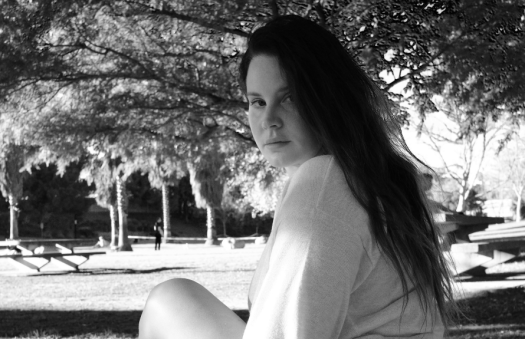"I'm kind of done with the precious media training. I'd rather people understand me for who I am."
One can just picture the record label rep cringing as singer-songwriter Laura Mvula makes that comment.
Since her 2013 debut — the superlative Steve Brown-produced Sing to the Moon — Mvula's life has been a whirlwind of hit singles, videos and steady tour dates. But underneath it all, she was suffering. Her parents divorced, and her own marriage was failing. Bouts of acute anxiety, sleepless nights and panic attacks were and still are a part of her life. Things came to a head in a recent interview with UK publication The Guardian, when, in what was intended to be a straightforward interview promoting her second album, it become a tell-all for Mvula where she revealed the behind-the-scene struggles where even getting through a normal day was a challenge.
Now, her sophomore album The Dreaming Room (out now on Sony) tosses caution to the wind. The 12-track record is bold, valiant and a bit on the psychedelic side as it builds off the artistic expression that was her debut. The Birmingham, UK soul singer-songwriter notes that while her breakout debut Sing to the Moon was steeped in soul, jazz and gospel, this time out she wanted to be a bit more daring, more experimental — even at the risk of being non-commercial, and notes of Afrobeat, electric guitar, synth and orchestral sounds permeate. In addition, her distinctive, signature vocals have evolved and been refined.
It was all for her sense of well-being to get things off her chest, she tells Exclaim! "It feels natural and right for me, the difference between being private and being fair. I don't want to lie anymore. It was one of those classic Laura things — perhaps it wasn't completely thought through at the time," she says matter-of-factly.
"Perhaps I was frustrated with interviews, that I didn't not want be frank about my marriage, anxiety and my general state of being. It's such a tangible feeling to struggle with my panic attacks."
Mvula has been hailed for being so forthright about mental health issues, something that she's not sure she is completely comfortable with.
"I don't know if role model is something I want to be — I'm selfish like that — but anything that breaks down the stigma or doesn't feed into the taboo of mental health being something we should be ashamed about [is good]. Especially in the UK, with a culture of reservedness and keeping up the stiff upper lip and appearances," she says.
"The most basic thing I've learned is there's something powerful in speaking out and breaking silence. [Stigma] loses its power quite quickly when you realize that others struggle as well. Part of the power of the mind is that you think you're absolutely alone. I'm proud to be part of the team that's about tearing that down, saying 'Here I am.'
"Sing to the Moon was a different recording struggle as a virgin artist. I had never sung in a studio before," she says. "I knew that I wanted to have even more creative freedom. The last album was quintessentially orchestral — I knew I wanted to expand on that."
That said, while creating the album was cathartic and freeing from an artistic perspective, it was also "terrifying" in a way. "I would get upset about talking about what's next …the fear of not knowing if I had anything else to say. I think I managed to move past that fear and be quiet and be happy in my own creative skin — which took a really long time to achieve."
In addition, the creative process was much different and more collaborative this time out; the new record took a lot time to create in comparison to the debut.
"It was so slow, unfamiliar, scary and the world of collaboration was new to me. I've worked with session musicians before, but never worked with legends [such as Miles Davis collaborator John Scofield, funk guitar guru Nile Rodgers and the London Sympathy Orchestra]. "The intimidation was like next level, but I loved it. It took a minute to find the new language, as it was another colour to my personality."
This time out, she experimented with more guitar and synth sounds: "I wanted music that would make me want to dance. That was the main thing. I knew I would be naturally going into a different direction than Sing to the Moon, which was uniquely intimate and understated in a way."
Mvula believes that The Dreaming Room is an "important record," but wouldn't be surprised if doesn't have the initial commercial success her record label might be looking for. "Things that are really treasured pieces of art just don't make sense until long after. This record is something that I slaved over for a long time. It took everything to make this record. That's why it's a success to me."
Check out the South African-shot video for "Phenomenal Woman" below.
One can just picture the record label rep cringing as singer-songwriter Laura Mvula makes that comment.
Since her 2013 debut — the superlative Steve Brown-produced Sing to the Moon — Mvula's life has been a whirlwind of hit singles, videos and steady tour dates. But underneath it all, she was suffering. Her parents divorced, and her own marriage was failing. Bouts of acute anxiety, sleepless nights and panic attacks were and still are a part of her life. Things came to a head in a recent interview with UK publication The Guardian, when, in what was intended to be a straightforward interview promoting her second album, it become a tell-all for Mvula where she revealed the behind-the-scene struggles where even getting through a normal day was a challenge.
Now, her sophomore album The Dreaming Room (out now on Sony) tosses caution to the wind. The 12-track record is bold, valiant and a bit on the psychedelic side as it builds off the artistic expression that was her debut. The Birmingham, UK soul singer-songwriter notes that while her breakout debut Sing to the Moon was steeped in soul, jazz and gospel, this time out she wanted to be a bit more daring, more experimental — even at the risk of being non-commercial, and notes of Afrobeat, electric guitar, synth and orchestral sounds permeate. In addition, her distinctive, signature vocals have evolved and been refined.
It was all for her sense of well-being to get things off her chest, she tells Exclaim! "It feels natural and right for me, the difference between being private and being fair. I don't want to lie anymore. It was one of those classic Laura things — perhaps it wasn't completely thought through at the time," she says matter-of-factly.
"Perhaps I was frustrated with interviews, that I didn't not want be frank about my marriage, anxiety and my general state of being. It's such a tangible feeling to struggle with my panic attacks."
Mvula has been hailed for being so forthright about mental health issues, something that she's not sure she is completely comfortable with.
"I don't know if role model is something I want to be — I'm selfish like that — but anything that breaks down the stigma or doesn't feed into the taboo of mental health being something we should be ashamed about [is good]. Especially in the UK, with a culture of reservedness and keeping up the stiff upper lip and appearances," she says.
"The most basic thing I've learned is there's something powerful in speaking out and breaking silence. [Stigma] loses its power quite quickly when you realize that others struggle as well. Part of the power of the mind is that you think you're absolutely alone. I'm proud to be part of the team that's about tearing that down, saying 'Here I am.'
"Sing to the Moon was a different recording struggle as a virgin artist. I had never sung in a studio before," she says. "I knew that I wanted to have even more creative freedom. The last album was quintessentially orchestral — I knew I wanted to expand on that."
That said, while creating the album was cathartic and freeing from an artistic perspective, it was also "terrifying" in a way. "I would get upset about talking about what's next …the fear of not knowing if I had anything else to say. I think I managed to move past that fear and be quiet and be happy in my own creative skin — which took a really long time to achieve."
In addition, the creative process was much different and more collaborative this time out; the new record took a lot time to create in comparison to the debut.
"It was so slow, unfamiliar, scary and the world of collaboration was new to me. I've worked with session musicians before, but never worked with legends [such as Miles Davis collaborator John Scofield, funk guitar guru Nile Rodgers and the London Sympathy Orchestra]. "The intimidation was like next level, but I loved it. It took a minute to find the new language, as it was another colour to my personality."
This time out, she experimented with more guitar and synth sounds: "I wanted music that would make me want to dance. That was the main thing. I knew I would be naturally going into a different direction than Sing to the Moon, which was uniquely intimate and understated in a way."
Mvula believes that The Dreaming Room is an "important record," but wouldn't be surprised if doesn't have the initial commercial success her record label might be looking for. "Things that are really treasured pieces of art just don't make sense until long after. This record is something that I slaved over for a long time. It took everything to make this record. That's why it's a success to me."
Check out the South African-shot video for "Phenomenal Woman" below.




